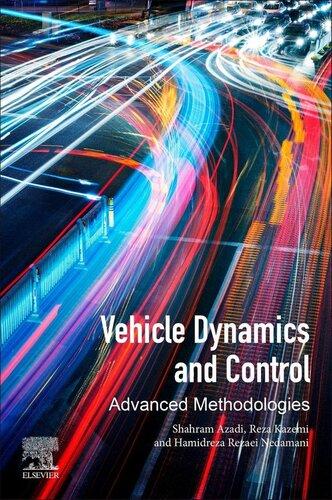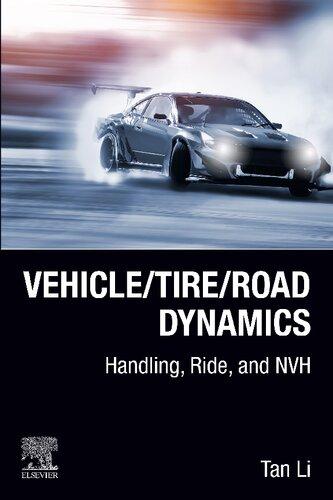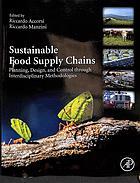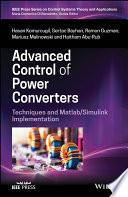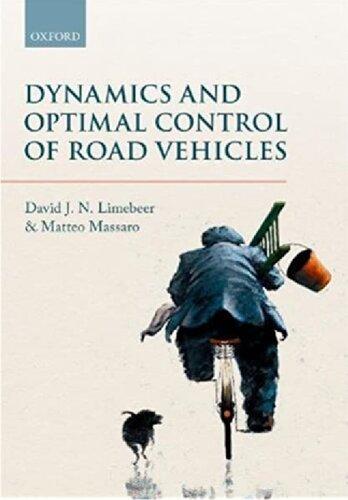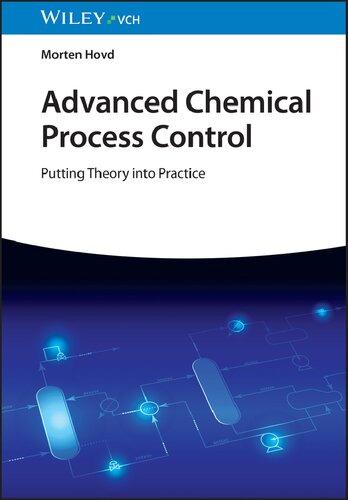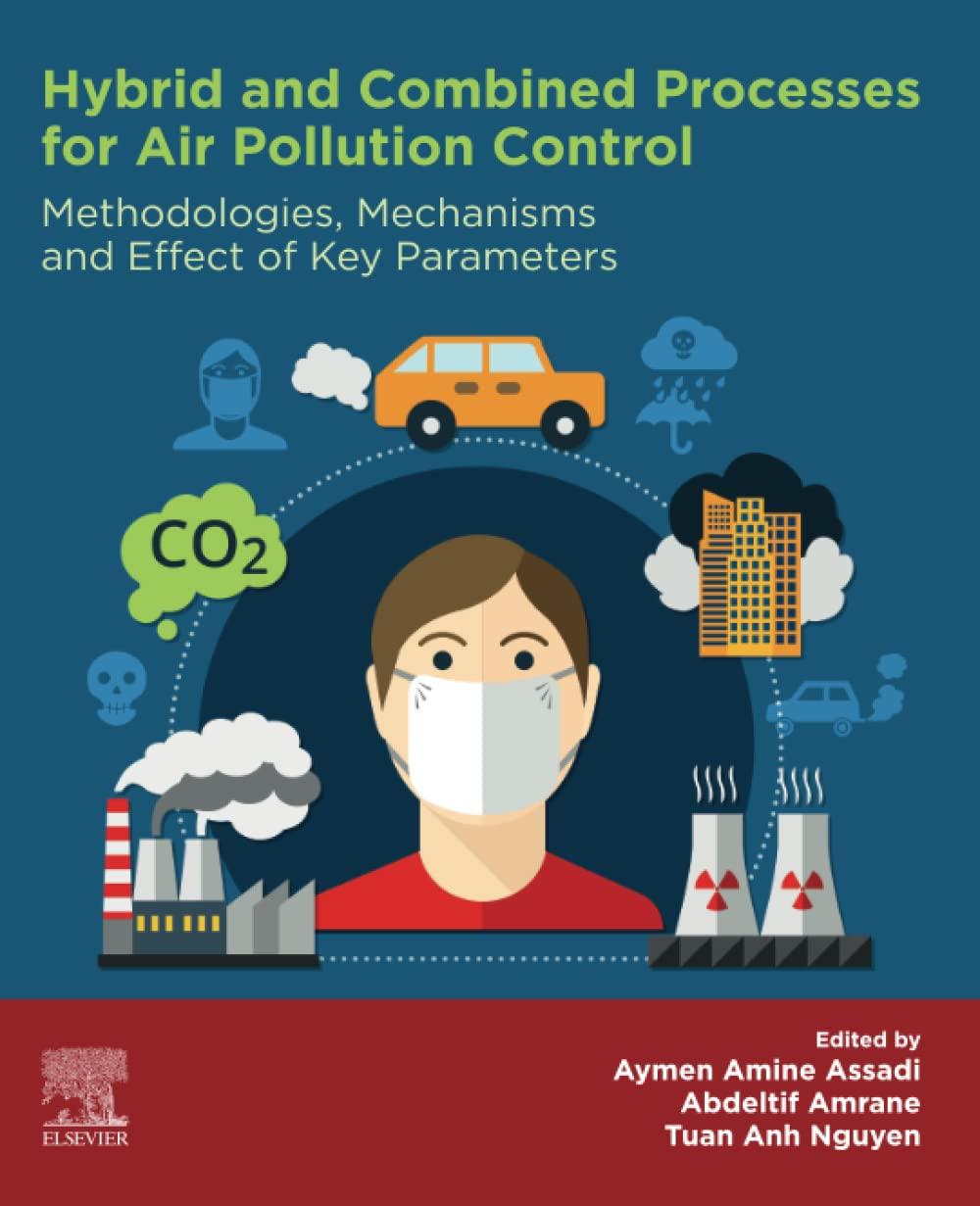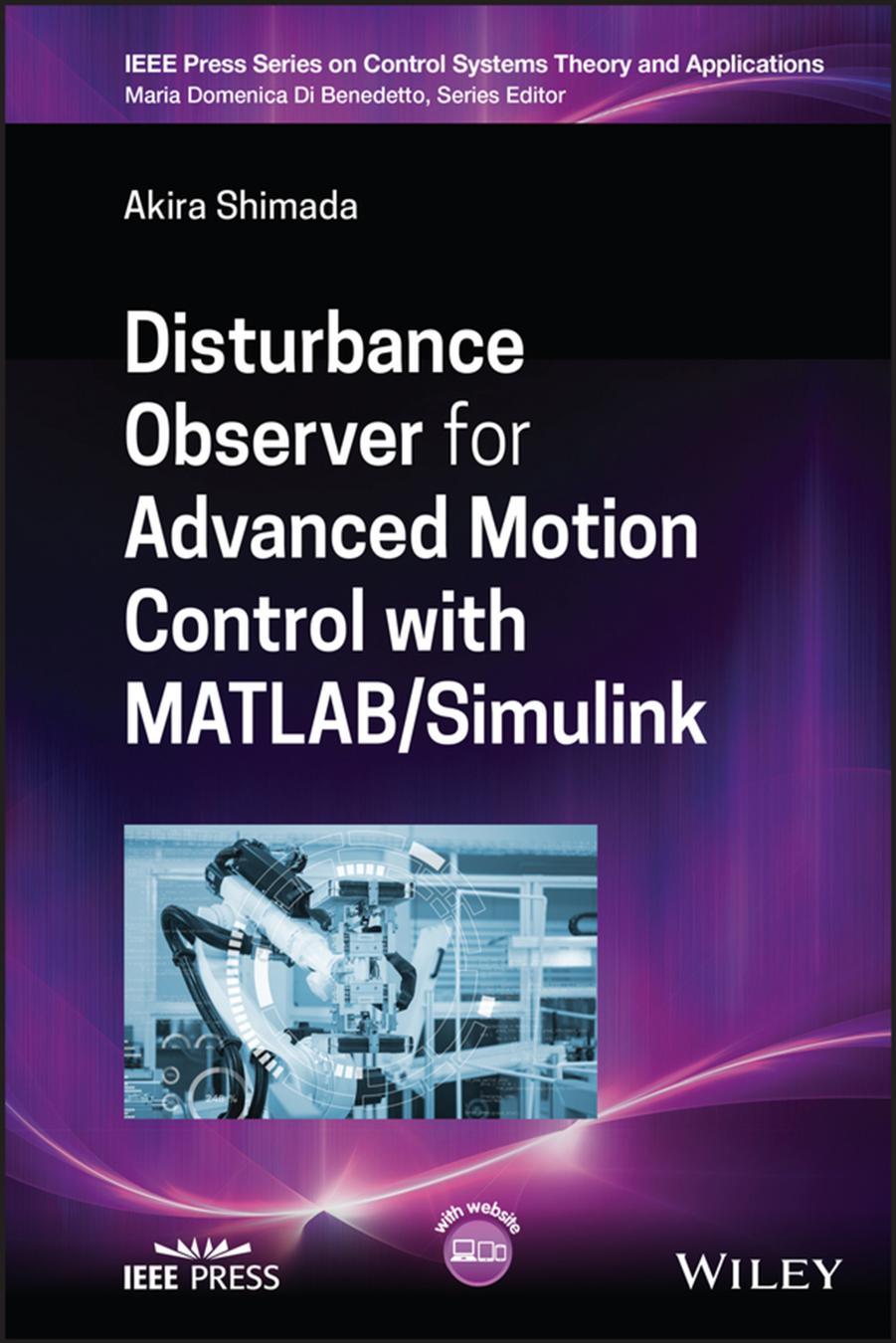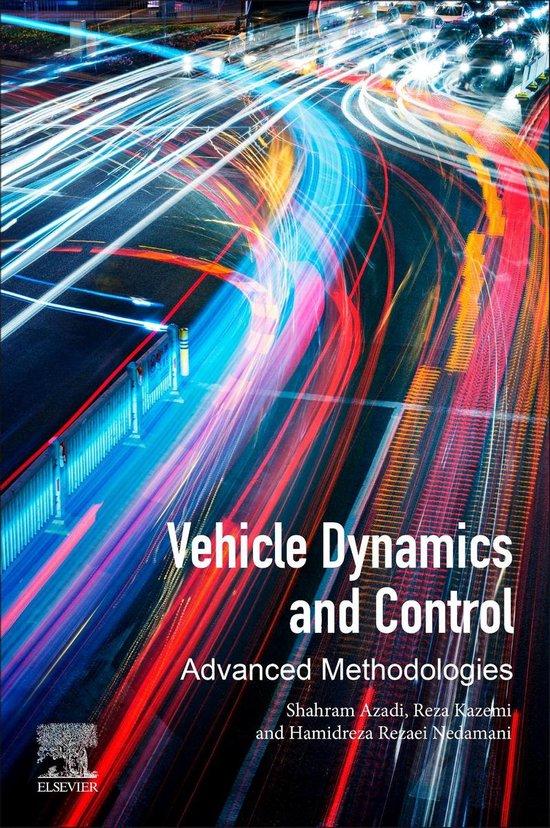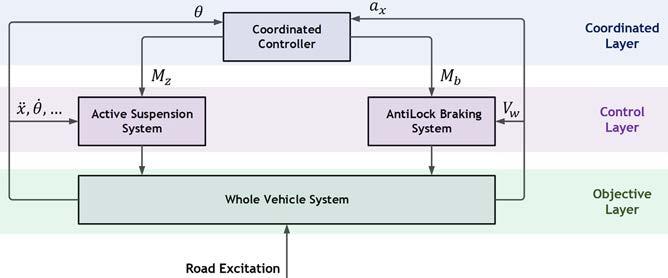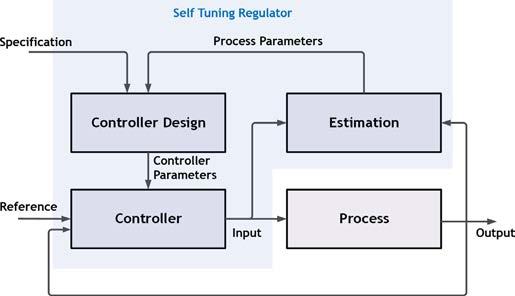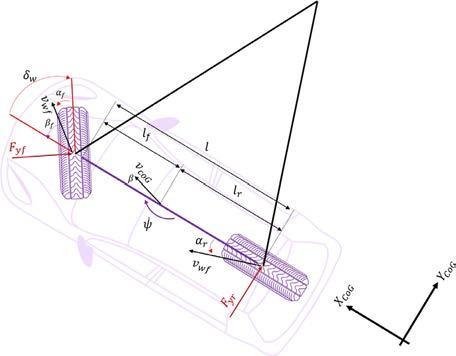Integratedvehicledynamics andsuspensioncontrol
1.1Introduction
Modernvehiclesincludeseveralcontrolsystemsresponsibleforawide varietyofcontroltasks.Areviewofpastcontrolsystemsrevealsthatthe controllerwasindividuallydesignedandimplementedonthevehicle.However,withmodernadvancementsinelectronicsystems,remarkableprogress hasbeenmadeinanalyzing,transferring,andtransmittingdatainthedigital field.Therefore,thisindustryiswitnessingtheemergenceofnoveltechniquesandideasinintegratingcontrolsystemstoimprovetheoverallvehicle performanceandoptimizecosts.Currently,vehiclesareequippedwith manycontrolsystems,whichincreasestheircomplexity.
Themostcommonlypresentedsolutio nistheuseofhierarchicalcontrolstructures,inthesensethatallcontrolcommandsarecomputedusing asinglecentralalgorithm,andtheke ytocontrolintegrationisthecoordinationofsubsystemperformance.Accordingtothedefinitionpresented in [1],theintegratedvehicledynamicscontrolcanbeconsideredresponsibleforcombiningandcoordinatinga llthecontrolsubsystemsaffecting thevehicle’sdynamicsbehaviortoimproveperformance,safety,andcomfortwhilereducingcosts.
Chassiscontrolsystemsfollowtwomainobjectives:handlingandride comfort.Thesesystemsaredividedintoactiveandpassiveclasses.Seatbelts andairbagsarecommonpassivesystems.Passivesystemsusuallyreducethe damagefromaccidents,whereasactivesystemspreventtheoccurrenceof accidents.Ontheotherhand,activesystemsprimarilyavoidsomeofthe vehicle’sunwantedevents,suchaswheellocking,tractiondissipation,or excessivechangesintherollandyawangles,whichcanresultintheloss ofvehiclecontrolbythedriver.Inotherwords,inthecaseofincorrectvehiclebehavior,thesesystemseitherfullytakecontrolofthevehicleorparticipatewiththedriverinthevehicle’scontroluntilthevehiclebehavioris corrected [2].
Insummary,thereasonsforthetendencytowardintegrationarethe following:
▪ Diversityofcontrolsystems
▪ Diversityinthetechnologyandrequirementsofeachsystem
▪ Independentperformanceofthesesystems
▪ Undesiredeffectsofthesesystemsoneachother.
Handlingandridecomforthaveaninverserelationship,suchthatan improvementinoneleadstoalossintheother.Forexample,toimprove vehiclehandling,itispreferabletoincreasethedampingratioandstiffness ofthedampers,whichdecreasestheridecomfort [3].Accordingtothese discussionsandthefactthatcontrolsystemsusuallyimproveonlyoneof thesetwoparameters,asignificantroleintegrationcancombinethesystems relatedtotheseparameters.Severaltechniqueshavebeendevelopedtoreach integratedcontrolofthechassis.Thesetechniquescanbedividedintothe followingtwogroups:
▪ Multivariablecontrol
▪ Hierarchicalcontrol.
Inthischapter,weusedahierarchicalcontrolsystem.Theadvantagesof hierarchicalcontrolincludethefollowing:
▪ Facilitationofdesigningcontrolsubsystems
▪ Controlofthecomplexitiesbytakingthemintoaccountinthelower controllayers
▪ Preferenceformoretasksandworkload.
1.2Controlsystemdesign
Fig.1.1 showsanintegratedcontrolsystemwithahierarchicalstrategythat hascombinedABS(antilockbrakingsystem)andASS(activesuspension system).ThelowercontrollerlayerconsistsoftheindividualABSand ASS,whereastheupperlayercontainsanalgorithmforcombiningthe twosystems.Indeed,suchaprocessismorestraightforwardandmore understandablethanacomplicatedmodelwithasinglecontrollayerfor reachingthedesiredstate [4]
Oneofthemostimportantfactorsinachievingthemainobjectivesisa suitableintegrationalgorithm.Thisisthemostimportantgoalinthecurrent chapter.Inthealgorithmusedduringthevehiclemaneuver,contact betweenthetireandtheroadmaybeeliminatedduetotheexisting
3 Integratedvehicledynamicsandsuspensioncontrol
Fig.1.1 Sampleofanintegratedcontrolsystemwithahierarchicalstrategy.
conditions,especiallyroadinput.Itisworthmentioningthattheridecomfortisimportantundernormalconditions,andthesystemmustactinsucha waythatthepassengerdoesnotbecometiredundernormaldriving conditions.
Inthischapter,self-tuningregulator(STR)adaptiveoptimalcontrolis selectedtoexplainthecontrolstructurebyintroducingtheoptimalcontrol strategyandtherecursiveleastsquares(RLS)errorestimator.TheselftuningregulatoradaptivecontrolstrategyisusedtodesigntheESP(electronicstabilityprogram).ThealgorithmusedtodesigntheABSissimple andconsistsofseverallogicalconditions.Moreover,anoptimalcontrol strategyhasbeenusedtodesigntheASS.Finally,theintegrationalgorithm utilizedwillbeintroduced.
Adaptivecontrolisdefinedasacontrolschemewithadjustableparametersandamechanismforadaptingtheparameters.Thereasonsforusingthis strategyincludethefollowing:
▪ Changesintheprocessdynamics
▪ Changesinthepropertiesofthesystemdisturbance
▪ Engineeringefficiencyandsimplicityofuse
▪ Variousadaptivecontrolideas
▪ Gainscheduling.
IntheSTRstructure,thecontrollerisupdatedbyestimatingtheparameters. Theself-tuninginthiscontrollermeansthatthecontrollerparametersare tunedautomaticallytoattainthedesiredstate;see Fig.1.2[5].
IntheSTRmethod,weupdatethestructureofthecontroller,butwe alsoupdatethedesiredstateinthedesignoftheESP.TheSTRmethodwill
assisttheoptimalcontrolmethodintheproposedalgorithm.TheRLS methodhasbeenemployedtoestimatethesystemparameters.Thecombinationofthesetwomethodswillprovideuswithaself-tuningadaptive controllerthatupdatesineachstepwithchangesinthesystemparameters. Aswillbediscussed,significantandwidechangesinthelateralstiffness ofthetiresmakeitimpossibletoobtainthedesiredresultsusingonly optimalcontrol.Becausechangesintheparametersaffectingthesystem vibrationsareslight,theLQRcontrolstrategyisusedaloneinthedesign oftheASS.
1.2.1DesignoftheESP
1.2.1.1Lateralforceestimator
Theself-tuningadaptivecontrolstrategyhasbeenemployedtodesignthe ESP.Forthispurpose,anestimatorsuitableforthissystemmustbedevelopedfirst.Itisworthmentioningthattheparameterswiththemostchanges intheESPcontrolsystem’sdesignarethelateralstiffnessofthefrontandrear wheels.Thevariationrangesoftheseparameterschangewithachangeinthe roadsurfacematerialoreveninthetireload.Theestimatorisresponsiblefor determiningthevaluesofthesetwoparametersateachinstant.Inthissection,weusetheequationsofthebicyclemodel,asshownin Fig.1.3.These equationsarepresentedinEqs. (1.1)–(1.3);
Fig.1.2 STRschematic.
where Cαf and Cαr aretheturningconstantsofthefrontandreartires, respectively.Tothisend,weusethebicyclemodelintheformofEq. (1.4);
InEq. (1.4),thevaluesof ay and _ r arereadilydeterminedusingtheexistingsensors.Moreover, Mz istheoutputofthissystem.Asmentionedbefore, Fyf and Fyr aretheparametersthatmustbeestimated.Thelastequationcan bewrittenintheformofEqs. (1.5)and(1.6) tousetheRLSmethod.
Afterdeterminingthelateralforcesandobtainingtheslipanglevalues fromtheaboverelationships,thelateralstiffnessvaluescanbedetermined.
Fig.1.3 Vehiclebicyclemodel.
Another random document with no related content on Scribd:
“Excuse me, sir,” said the gentleman, looking hard into Leonard’s face; “but unless these sharp eyes of mine are mistaken, which they seldom are, I see a nephew whom, perhaps, I behaved to rather too harshly, but who still has no right to forget Richard Avenel.”
“My dear uncle,” exclaimed Leonard, “this is indeed a joyful surprise; at a time, too, when I needed joy! No; I have never forgotten your kindness, and always regretted our estrangement.”
“That is well said; give us your fist again. Let me look at you—quite the gentleman I declare!—still so good-looking too. We Avenels always were. Good bye, Baron Levy. Need not wait for me; I am not going to run away. I shall see you again.”
“But,” whispered Levy, who had followed Avenel across the street, and eyed Leonard with a quick curious searching glance—“but it must be as I say with regard to the borough; or (to be plain) you must cash the bills on the day they are due.”
“Very well, sir—very well. So you think to put the screw upon me, as if I were a poor ten-pound householder. I understand—my money or my borough?”
“Exactly so,” said the Baron, with a soft smile.
“You shall hear from me—you shall hear from me. (Aside, as Levy strolled away)—D——d tarnation rascal!”
Dick Avenel then linked his arm in his nephew’s, and strove for some minutes to forget his own troubles, in the indulgence of that curiosity in the affairs of another which was natural to him, and, in this instance, increased by the real affection which he had felt for Leonard. But still his curiosity remained unsatisfied; for long before Leonard could overcome his habitual reluctance to speak of his success in letters, Dick’s mind wandered back to his rival at Screwstown, and the curse of “over-competition”—to the bills which Levy had discounted, in order to enable Dick to meet the crushing force of a capitalist larger than himself—and the “tarnation rascal” who now wished to obtain two seats at Lansmere, one for Randal Leslie, one for a rich Nabob whom Levy had just caught as a client; and Dick, though willing to aid Leslie, had a mind to the other seat for himself. Therefore Dick soon broke in upon the hesitating confessions of Leonard, with exclamations far from pertinent to the subject, and rather for the sake of venting his own griefs and
resentment than with any idea that the sympathy or advice of his nephew could serve him.
“Well, well,” said Dick, “another time for your history. I see you have thrived, and that is enough for the present. Very odd; but just now I can only think of myself. I’m in a regular fix, sir. Screwstown is not the respectable Screwstown that you remember it—all demoralised and turned topsy-turvy by a demoniacal monster capitalist, with steam-engines that might bring the falls of Niagara into your back parlour, sir! And, as if that was not enough to destroy and drive into almighty shivers a decent fair-play Britisher like myself, I hear he is just in treaty for some patent infernal invention that will make his engines do twice as much work with half as many hands! That’s the way those unfeeling ruffians increase our poorrates! But I’ll get up a riot against him—I will! Don’t talk to me of the law! What the devil is the good of the law if it don’t protect a man’s industry—a liberal man, too, like me!” Here Dick burst into a storm of vituperation against the rotten old country in general, and the monster capitalist of Screwstown in particular.
Leonard started; for Dick now named, in that monster capitalist, the very person who was in treaty for Leonard’s own mechanical improvement on the steam-engine.
“Stop, uncle—stop! Why, then, if this man were to buy the contrivance you speak of, it would injure you?”
“Injure me, sir! I should be a bankrupt—that is, if it succeeded; but I daresay it is all a humbug.”
“No, it will succeed—I’ll answer for that!”
“You! You have seen it?”
“Why, I invented it.”
Dick hastily withdrew his arm from Leonard’s.
“Serpent’s tooth!” he said, falteringly, “so it is you, whom I warmed at my hearth, who are to ruin Richard Avenel?”
“No—but to save him! Come into the city and look at my model. If you like it, the patent shall be yours!”
“Cab—cab—cab,” cried Dick Avenel, stopping a “Hansom;” “jump in, Leonard—jump in. I’ll buy your patent—that is, if it is worth a straw; and as for payment—”
“Payment! Don’t talk of that!”
“Well, I won’t,” said Dick, mildly; “for ’tis not the topic of conversation I should choose myself, just at present. And as for that black-whiskered alligator, the Baron, let me first get out of those rambustious unchristian filbert-shaped claws of his, and then—But jump in—jump in—and tell the man where to drive!”
A very brief inspection of Leonard’s invention sufficed to show Richard Avenel how invaluable it would be to him. Armed with a patent, of which the certain effects in the increase of power and diminution of labour were obvious to any practical man, Avenel felt that he should have no difficulty in obtaining such advances of money as he required, whether to alter his engines, meet the bills discounted by Levy, or carry on the war with the monster capitalist. It might be necessary to admit into partnership some other monster capitalist—What then? Any partner better than Levy. A bright idea struck him.
“If I can just terrify and whop that infernal intruder on my own ground, for a few months, he may offer, himself, to enter into partnership—make the two concerns a joint-stock friendly combination, and then we shall flog the world.”
His gratitude to Leonard became so lively that Dick offered to bring his nephew in for Lansmere instead of himself; and when Leonard declined the offer, exclaimed, “Well, then, any friend of yours; you have only to say the word at the last hour, for I am sure of both seats. I’m all for Reform against those high and mighty right honourable boroughmongers; and what with loans and mortgages on the small householders, and a long course of “free and easies,” with the independent Freemen, I carry the town of Lansmere in my breeches pocket.” Dick then, appointing an interview with Leonard at his lawyer’s, to settle the transfer of the invention, upon terms which he declared “should be honourable to both parties,” hurried off, to search amongst his friends in the city for some monster capitalist, who might be induced to extricate him from the jaws of Levy, and the engines of his rival at Screwstown. “Mullins is the man, if I can but catch him,” said Dick. “You have heard of Mullins?—A wonderful great man; you should see his nails; he never cuts them! Three millions, at least, he has scraped together with those nails of his, sir. And in this rotten old country, a man must have nails a yard long to
fight with a devil like Levy! Good bye—good bye GOOD bye, my DEAR nephew!”
CHAPTER XX.
Harley L’Estrange was seated alone in his apartments. He had just put down a volume of some favourite classic author, and he was resting his hand firmly clenched upon the book. Ever since Harley’s return to England, there had been a perceptible change in the expression of his countenance, even in the very bearing and attitudes of his elastic youthful figure. But this change had been more marked since that last interview with Helen which has been recorded. There was a compressed resolute firmness in the lips—a decided character in the brow. To the indolent careless grace of his movements had succeeded a certain indescribable energy, as quiet and self-collected as that which distinguished the determined air of Audley Egerton himself. In fact, if you could have looked into his heart, you would have seen that Harley was, for the first time, making a strong effort over his passions and his humours; that the whole man was nerving himself to a sense of duty. “No,” he muttered—“no—I will think only of Helen; I will think only of real life! And what (were I not engaged to another) would that dark-eyed Italian girl be to me?—What a mere fool’s fancy is this! I love again—I who, through all the fair spring of my life, have clung with such faith to a memory and a grave! Come, come, come, Harley L’Estrange, act thy part as man amongst men, at last! Accept regard; dream no more of passion. Abandon false ideals. Thou art no poet—why deem that life itself can be a poem?”
The door opened, and the Austrian Prince, whom Harley had interested in the cause of Violante’s father, entered with the familiar step of a friend.
“Have you discovered those documents yet?” said the Prince. “I must now return to Vienna within a few days. And unless you can arm me with some tangible proof of Peschiera’s ancient treachery, or some more unanswerable excuse for his noble kinsman, I fear that there is no other hope for the exile’s recall to his country than what lies in the hateful option of giving his daughter to his perfidious foe.”
“Alas!” said Harley, “as yet, all researches have been in vain; and I know not what other steps to take, without arousing Peschiera’s
vigilance, and setting his crafty brains at work to counteract us. My poor friend, then, must rest contented with exile. To give Violante to the Count were dishonour. But I shall soon be married; soon have a home, not quite unworthy of their due rank, to offer both to father and to child.”
“Would the future Lady L’Estrange feel no jealousy of a guest so fair as you tell me this young signorina is? And would you be in no danger yourself, my poor friend?”
“Pooh!” said Harley, colouring. “My fair guest would have two fathers; that is all. Pray do not jest on a thing so grave as honour.”
Again the door opened, and Leonard appeared.
“Welcome,” cried Harley, pleased to be no longer alone under the Prince’s penetrating eye—“welcome. This is the noble friend who shares our interest for Riccabocca, and who could serve him so well, if we could but discover the document of which I have spoken to you.”
“It is here,” said Leonard simply; “may it be all that you require!”
Harley eagerly grasped at the packet, which had been sent from Italy to the supposed Mrs Bertram, and, leaning his face on his hand, rapidly hurried through the contents.
“Hurrah!” he cried at last, with his face lighted up, and a boyish toss of his right hand. “Look, look, Prince, here are Peschiera’s own letters to his kinsman’s wife; his avowal of what he calls his ‘patriotic designs;’ his entreaties to her to induce her husband to share them. Look, look, how he wields his influence over the woman he had once wooed; look how artfully he combats her objections; see how reluctant our friend was to stir, till wife and kinsman both united to urge him.”
“It is enough,—quite enough,” exclaimed the Prince, looking at the passages in Peschiera’s letters which Harley pointed out to him.
“No, it is not enough,” shouted Harley as he continued to read the letters with his rapid sparkling eyes. “More still! O villain, doubly damned! Here, after our friend’s flight, here, is his avowal of guilty passion; here he swears that he had intrigued to ruin his benefactor, in order to pollute the home that had sheltered him. Ah! see how she answers; thank Heaven her own eyes were opened at last, and she scorned him before she died. She was innocent! I said so. Violante’s
mother was pure. Poor lady, this moves me! Has your Emperor the heart of a man?”
“I know enough of our Emperor,” answered the Prince warmly, “to know that, the moment these papers reach him, Peschiera is ruined, and your friend is restored to his honours. You will live to see the daughter, to whom you would have given a child’s place at your hearth, the wealthiest heiress of Italy—the bride of some noble lover, with rank only below the supremacy of kings!”
“Ah!” said Harley, in a sharp accent, and turning very pale—“ah, I shall not see her that! I shall never visit Italy again!—never see her more—never, after she has once quitted this climate of cold iron cares and formal duties—never, never!” He turned his head for a moment, and then came with quick step to Leonard. “But you, O happy poet! No ideal can ever be lost to you. You are independent of real life. Would I were a poet!” He smiled sadly.
“You would not say so, perhaps, my dear lord,” answered Leonard with equal sadness, “if you knew how little what you call ‘the ideal’ replaces to a poet the loss of one affection in the genial human world. Independent of real life! Alas! no. And I have here the confessions of a true poet-soul, which I will entreat you to read at leisure; and when you have read, answer if you would still be a poet!”
He took forth Nora’s MSS. as he spoke.
“Place them yonder, in my secrétaire, Leonard; I will read them later.”
“Do so, and with heed; for to me there is much here that involves my own life—much that is still a mystery, and which I think you can unravel!”
“I!” exclaimed Harley; and he was moving towards the secrétaire, in a drawer of which Leonard had carefully deposited the papers, when once more, but this time violently, the door was thrown open, and Giacomo rushed into the room, accompanied by Lady Lansmere.
“Oh, my lord, my lord!” cried Giacomo, in Italian, “the signorina! the signorina!—Violante!”
“What of her? Mother, mother! what of her? Speak, speak!”
“She has gone—left our house!”
“Left! No, no!” cried Giacomo, “She must have been deceived or forced away. The Count! the Count! Oh, my good lord, save her, as you once saved her father!”
“Hold!” cried Harley. “Give me your arm, mother. A second such blow in life is beyond the strength of man—at least of mine. So, so!—I am better now! Thank you, mother. Stand back, all of you—give me air. So the Count has triumphed, and Violante has fled with him! Explain all—I can bear it!”
THE EARL OF DERBY’S APPEAL TO THE COUNTRY.
When we addressed our readers, in the month of June last,[10] in a very earnest, and perhaps a somewhat apprehensive spirit, we declared that we did so “on the eve of a tremendous conflict, the results of which, in our deliberately formed opinion, shared by every thinking and experienced politician in the kingdom, affect the welfare of the Empire to an extent almost unprecedented, and also, at present, utterly incalculable.” That conflict has now taken place, or rather it is yet—while we are writing, very far on in this memorable month of July (the 24th inst.)—not quite over. It has been, indeed, a signal conflict: but between whom? And what is the issue? Has there been a victory, and consequently a defeat? Is it the Earl of Derby, sitting dismayed in his cabinet, from whose lips these sad words are at this moment falling, as he surveys the results of the general election of 1852, on which he had staked so much?—or is it his rival and opponent? But who is he?—or is his name legion? Is it Lord John Russell?—or Sir James Graham?—or the Duke of Newcastle?—or Lord Palmerston?—or, dropping for a moment to the dii minores, is it —Mr Cobden?
One fact is certain, that the Earl of Derby, on the 1st of July 1852, upon which day the writs were issued for a new election, deliberately gave battle to them all; having four months previously declared that he would do so. And on the occasion of making that declaration, he furthermore declared, in terms which no one could mistake, that he intended to do battle for the Constitution in Church and State—for the Protestant Constitution; and against those who were secretly or openly advancing to assail its integrity, under the baleful flag of D�������� and P�����. He and his advisers had been calm and quicksighted enough to see that such was the true nature of the great
electoral struggle ordained to take place in the month of July 1852; and they had also sufficient sagacity and resolution to foresee and defeat the cunning and desperate attempts which would be made by their opponents, to disguise the true nature and real objects of the contest, and shift the scene of it to a disadvantageous and deceptive locality. Those, indeed, who made this attempt, were wise in their generation, and did the very best thing that the nature of things admitted. Conscious of occupying a discreditable and desperate position, through their own imbecility and recklessness, the only chance of regaining lost ground, and making a tolerated appearance before the country, lay in attempting to enlist popular sympathies; and the felicitous device was, to persuade the millions that their bread was in danger;—but this was to be done, if at all successfully, so very suddenly, that the falsehood should not be found out before it had gained its object. The Earl of Derby was to be exhibited before women and children as a vampyre, but only for a moment, lest the false colours should dissolve away while they were being looked at, and a wise and benevolent statesman appear in his true figure and colours. Hence the convulsive effort that was made, the moment it was announced that his gracious Mistress had summoned him in a critical emergency to her counsels, to precipitate him into a contest before he had had a moment’s time to survey his new position, to summon his advisers about him—to tell friends from foes—and see what were the precise objects which they had to keep in view. “If,” said they, “Lord Derby be allowed to go to the country at his own time, and in his own way, the country will welcome him as a deliverer from mischievous misrule. Let us, therefore, force him to select our time, and our place, for fighting the battle. If we hesitate, we are lost; for he is strong and skilful, and the country acute and honest.” In vain the Earl said to his eager opponents, “By your leave, gentlemen; for a moment, by your leave. What is the meaning of all this feverish fidget? What are you afraid of?” “That you will take away the people’s bread; reverse a wise and beneficent policy; and not only bid the sun of commercial prosperity stand still, but go back, and so plunge us all into confusion and despair.” “I assure you,” quoth the Earl, “I am not going to attempt any of these things. I love the people as much as yourselves, and, with you, am one of them. My interests, like your own, are identical with theirs: I wish only to secure the safety of our institutions, the common interests of the Queen and the people,
against certain perils which I see distinctly, though you may not. And as to the corn question, in which you would tie up, and hide, and crush all others, I will have none of it. I have opinions of my own on the subject of corn laws, thinking it would be infinitely to the benefit of the community if I could at once derive a revenue for it from foreigners, and enable our own corn-growers to supply us with bread at a reasonable price, and foster and stimulate the energies of producers, and provide a safe, quick-paying home-market for them: thus protecting the interests of both the great classes of the community—producers and consumers. If, however, your longcontinued and systematic agitation and misrepresentations have succeeded in persuading the masses of society that my own views on that subject are at variance with theirs, and that theirs they are resolved shall prevail, be it so; I will do all I can, less than which I should desert my duty in doing;—I will take care to submit that particular question, in order to dissipate all doubt, to the deliberate decision of the country; and whatever that decision may be, I will cordially carry it out. But do you seriously suppose that this question is the only one by which I must stand or fall?—the only one for which the Queen called me to her counsels? O no, gentlemen. Whichever way the pleasure of the country may lie upon this question, it is but one, and that a subordinate one, of several—nay, of many; it is but one, and a subordinate interest among several intrusted to my consideration and my keeping. Suppose the corn question totally set aside, and at rest, and yourselves called to advise the Sovereign, and carry on the government of the country, what would you do, then? You may pause; but I know well what you would do. Judging from your own repeated declarations, you would, under the pretence of liberalising our institutions, intrust power to incompetent hands, to be used only for the furtherance of your own selfish purposes; they would nominally, and you as demagogues practically,[11] be the depositaries of power. Your avowed principles are inconsistent with the maintenance of our national independence; of the connection between Church and State; of the Protestant character of our institutions: the Queen’s throne would be shaken, and her crown quiver upon her sacred brow, if you were intrusted with the power for which you are so anxious. I see distinctly before me the crimsoned darkness of anarchy, and through it the fabric of a republic crumbling under a military despotism. Now, gentlemen, I fear God and honour
the Queen; I am heart and soul a Protestant; I am satisfied with our institutions, civil and religious, and believe that so are the people; but let them speak out for themselves on all these subjects, which I will submit to them with deliberate distinctness, despising your efforts to misrepresent my objects and principles, and await the decision with composure.” “Well, but, my Lord, how is this? Be so good as to tell us in detail what you are going to do if you should be continued in power; do not set us running about in search of shadows; do not amuse us with a series of dissolving views; give us something visible and tangible, in order that we may deal with it in our own way before the people.” “That is, in order that you may misrepresent it. No, my friends: you would have me do exactly what I will not do. It was by your own voluntary act that I am where I am. You should have considered consequences. I did, and have formed my purposes, and organised my plans. My character and principles are before the country, so are those of my colleagues. These principles I will reassert as emphatically as you please; and I pledge myself to carry them out in practice, if I have the opportunity.” “But you will delude the country: you will set them scampering in every direction after will-o’the-wisps, while you and your myrmidons are quietly stealing their bread, and forging chains and dungeons for them.” “Well, gentlemen, tell the country as much: see whether they will believe you. It is a fair question between us. You say that yourselves, and your doings are thoroughly well known to them. Well, if that be so, go and prosper with the constituencies, for they will give you their confidence if they think that you deserve it. But observe, my good friends: if, thus knowing you and your doings, those constituencies should decide against you, and in favour of me, my friends, and our principles, even though I expressly withhold a distinct declaration of the way in which I purpose to act upon them, what will you then say? That those whom they knew they reject, and have chosen others?” It is an ugly dilemma! “But, my Lord, you impute to us principles and purposes which we repudiate: we are not wolves in sheep’s clothing; we are good, honest folk, the best friends the people ever had—in fact, their true, as you their false friends.” “Well, gentlemen, what is easier than to tell them so? You are only losing time yourselves, and making me lose precious time myself; for all our hands are full, having the Queen’s business to do in every quarter of the globe. Good morning, my friends, away to the constituencies.” On this, one may conceive
that the colloquy ended, and the people’s imaginary deputation withdrew, with flushed faces, anxious brows, and disconcerted looks, to their council-chamber in Chesham Place. After a troubled silence, one lean flippant fellow among them possibly rose up, with his arms stuck a-kimbo, and said—“Lord Derby shall dissolve instanter: we will kick his people out of the House of Commons the very first day we meet, and so force him to dissolve; and I will bring out our trusty fellows of the League, subscribe a hundred thousand pounds, and in one month’s time annihilate the crazy Cabinet, and then there is an end of him!” But these wild counsels did not altogether prevail. The more steadily that matters were looked at by long-headed people, the more embarrassing was found the position which had been occupied. If the Earl of Derby should succeed in presenting himself to the people in his own way, and if they should think fit to say, “We will have no return to protective duties, but we feel that there is a great derangement of financial affairs which we believe you capable of rectifying; and, above all, we believe you a man of honour, and agree with you as to the existence of a dangerous conspiracy between Popery and Democracy:” where would then be those who had themselves driven him to appeal to the country? And as time wore on, it saw Faction baffled and crushed, and the new Ministers developing extraordinary aptitude for business; exhibiting uniform tact, temper, and firmness; overcoming obstacle after obstacle, formerly deemed insuperable; winning majorities in division after division, forced on them by their opponents; while no amount of newspaper stimulus could succeed in flurrying the spirits of the country into distrust or alarm. Not an opportunity was lost in either House of Parliament for gibing, taunting, misrepresenting, sedulously echoed by the Radical press out of doors, both metropolitan and provincial. In four months’ time, a skilfully-slandered Ministry succeeded in conducting to a satisfactory conclusion such a splendid amount of legislation as will ever render those four months memorable; and at the close of that eventful period, the Earl of Derby saw that the proper moment for appealing to the country had at length arrived: at the voice of the Queen, her Parliament dissolved away; and her people were free to choose another.
Now had arrived indeed the tug of war. Now was to be seen the fruit of those seeds which all parties had been sowing during the interval, with a view to propitiating the people. Those seeds had been
scattered by many hands, and were of various kinds. A large proportion of that seed consisted solely of distrust of Lord Derby, because he was Lord Derby, without principles or a policy; and this seed was deemed the most attractive and hopeful of any, by its venerable and volatile sower, who scattered it freely everywhere, watching its growth with deep solicitude, for he had laid out all the little he had left, of political capital, in order to purchase that seed. Said he to himself, with sometimes a sigh, and sometimes a smile, this will grow up, if at all, flexible and chameleon-hued, according to the condition of the political atmosphere; and the vast extent to which it is sown must, at all events, show the spirit and resources of the sower, and keep that personage prominently before the public eye. Another class of seeds had fallen from a desponding and anxious sower, who had been deposed by former followers and supporters from a proud position, and accused of having rendered necessary the sowing of any seed at all, at that particular conjuncture. He moved tremulously along, scattering his little seed, the growth of which, he evidently hoped, might be suitable for all purposes, and alarm no one prematurely. He was rudely jostled, however, by surly impudent fellows, who furiously stamped on what he had sown, and flung down thickly large crimson-coloured seed, which should by and by choke and overpower the other by its baleful and glaring crop. A few timid hands scattered seeds stealthily, those of parasitical plants, following in the wake of a burly sower in scarlet, full of deceit and insolence, dropping, as he went, dark and deadly seed, heedless of the alarm, the scorn, and the hatred which he by turns provoked. That seed was destined, in the sower’s expectation, to produce ere long a forest, overshadowing the land, with all manner of obscene birds lodging in its gloomy branches.
To drop metaphor, however, the appeal to the constituencies was undoubtedly made under circumstances calculated to occasion much anxiety to the Queen’s Ministers, under whose auspices that appeal was made. They were in a great minority in the House of Commons, and had been thrown into that minority by reason of their having been opposed to a measure which, by whatever means, had brought popularity to their opponents, the majority. The latter had astutely identified themselves with the most palatable topic that can ever be urged to the masses of the community—cheap food, without reference to all those deep and extensive political arrangements, necessarily
involved in the discussion concerning the import of foreign corn. Mr Cobden, for instance, was aware of being a mere cipher, disconnected with that question, the agitation of which had alone given him political importance, and an independent fortune, securing him leisure for all kinds of mischief; and it was his interest, and that of all those who were, with him, opposed to the Government, to interweave that popular topic with all other political topics, giving them, and those urging them, the hue of its popularity. Thus was the constituency carefully familiarised with a contrast between the friends of free and fettered trade, with all their respective advantages and disadvantages, and the applause or odium which either entailed. A second source of anxiety to the well-wishers of the Government, and unquestionably a great one, was that Government’s steady adherence to the expressed determination of its chief, on first assuming the reins of power, that he would indicate only the general PRINCIPLES on which his policy was founded, reserving all measures and details, till the period when he should be able to carry his plans and measures into effect. This was a severe test to be borne by any class whatever of aspirants to popular confidence and favour. It was saying, “We stand on character and principle; if you distrust either, withhold your support.” And this furnished such endless topics of effective ridicule and invective to the opponents of the Government, as required no small amount of moral courage in its supporters to encounter. These topics were used with systematic energy by a bitterly hostile press for several months previously to, as well as during, the momentous contest with which we are dealing; and it were idle to disguise that these efforts were made with great ability, and a very great measure of success. When, therefore, the struggle commenced, we ourselves said, It is a very critical one, entered upon under circumstances most unfavourable to the Government: and if, in spite of those immense disadvantages, the Government should be victorious, it will be a triumph indeed, and calculated to secure them both strength and permanence. A calm observer, however, of the position of parties and the course of events, could not fail to detect, on the other hand, certain disturbing forces inevitably affecting the tactics of the opponents of Ministers. The rashness of Lord John Russell in resigning the Government as he did; immediately recommending his gracious Mistress to summon Lord Derby to her counsels; and, instantly afterwards, suddenly repenting of what he
had done, and, stung by the keen reproaches of his supporters, organising an opposition to Lord Derby, simply because he had obeyed the royal command—alienated from him a great amount of that secret support on which he had so long been borne buoyant, and averted from him the countenance of men, though professing Liberal principles, yet characterised by independence and moderation. To attempt a coalition with such a man as Mr Cobden, and at the particular moment selected for the experiment, was one of the maddest tricks of modern politicians on record; alienating for ever a steady support, in the vain attempt to conciliate a contemptuous and distrustful patronage! If Lord John Russell were honest, and Mr Cobden honest, and both firm, what would be the inference?
Again, when the late members of the House of Commons were reduced to the rank of private citizens, they had belonged to various sects and parties, as the representatives of opinions not over easy to define and distinguish for practical electioneering purposes. There were fervent and lukewarm Conservatives, with corresponding Liberals; high church, low church, dissenters, Protestants, Roman Catholics, both in reality, and in name only. All these were now to present themselves to the country as worthy of its confidence, a considerable majority of them, however, being unable to state what public man they owned as leader, or to what party they professedly attached themselves. And many, indeed, wished themselves to be thenceforth regarded as leaders and founders of parties! And each individual’s ambition would suggest to him the necessity of considering how he intended hereafter, if elected into Parliament, practically to carry out his views, with reference to a sphere of action where unfortunately all could not be leaders. How, then, were all these to “go to the country?” And that country, too, a somewhat shrewd one!
The last Session of the Parliament of 1852 closed very quietly. Neither Lord Derby in the House of Lords, nor any of his colleagues or friends in the House of Commons, seized an opportunity for making, as with their power they could have made, a dazzling ad captandum appeal to the country. Very many of their supporters expected that this would have been done; but we are of opinion that, in not doing so, they acted with a dignity and self-reliance entitling them to the highest respect. They might, indeed, have pointed to a glittering catalogue of their doings during the Session—afforded their
supporters many rallying points, and secured among them a conspicuous consistency of means and objects; but these advantages appeared to be deliberately foregone. Never before, in our memory, did a Ministry, especially one so critically situated, and professedly on its trial, go to the country with less apparent effort to secure a favourable verdict. It amounted to an apparently indolent overconfidence, susceptible of being resolved by their enemies into a conscious unworthiness, and distrust alike of themselves, of their cause, and of the issue.
The Earl of Derby having distinctly announced, in the month of February, that he should be guided by the legitimately expressed voice of the country, in reimposing, or abstaining from reimposing, duties on corn; and, moreover, that he would not attempt to do so, unless the country should decide in favour of such a policy by an unequivocal and even a great majority, some two months afterwards made another announcement, in answer to one of the many interpellations with which he was perseveringly harassed by his opponents in the House of Lords. He said that, if it would afford them any satisfaction, he already distinctly saw that the voice of the country would be pronounced against the reimposition of duties on corn, whether for purposes of protection or revenue. Forthwith there arose a cry among his opponents and their advocates, “Then at once retire, as avowedly vanquished Protectionists!” and nothing could exceed the rancorous reiteration of the demand. Lord Derby, however, remained unmoved; and his enemies, beginning to fear that they had to deal with one of thoroughly settled purpose, anxiously cast about for other topics of disparagement against the coming elections. The public themselves, however, seemed so provokingly indifferent to their efforts, that it was deemed unsafe to attempt an open organisation of opposition, or to inaugurate it by formal appeals to the country, in the shape of public meetings. Not one was called throughout the length and breadth of the land! although it was occasionally whispered that a great staff of agitators at Manchester, amply officered, and largely supplied with the sinews of war, were ready to start into action at a moment’s notice. But in defence of what? Lord Derby had already declared that the corn laws were out of his reach, and his supporters were almost everywhere using the same language; many of them accompanying it, however, with avowals that their opinions were unchanged, though the temper of the masses of
society rendered it impossible to act up to those opinions. Then—said his enemies—is not this monstrous? The cause of Free Trade is now in the keeping of false friends, or rather of its enemies, who are only apparently surrendering their opinions and intentions, in order subtlely and indirectly to effectuate them by and by! and there arose the cry that this was to be done by the juggle of readjusting taxation. On this point the Ministers and their friends avowed that they were concentrating their attention with a view to redress glaring injustice; but beyond that general declaration they could be induced to say nothing. In the mean time, the nation began to speak out for itself unequivocally on another great subject of its anxiety—the safety of our Protestant institutions, threatened by Dr Wiseman and his allies in Ireland, in a spirit of deadly hatred and unwavering resolution. They did not condescend to conceal or disguise their intention of securing a large accession of force in the new House of Commons—a course of procedure, however, calculated directly to strengthen the hands of the Government, who were at all events known to be thoroughly in earnest upon the subject of Protestantism. Concurrently with this, there existed another subject of anxiety among moderate men of all parties—the sweeping changes, of a democratic tendency, proposed by Lord John Russell and his new friends to be effected in our political institutions. The Earl of Derby took several opportunities of declaring publicly and unequivocally his determination to resist all attempts of this kind, come in whatever shape, and from whatever quarter, they might; and the practical result of all this was, that he stood, on the eve of the all-important appeal to the country, in the character of a P��������� C����������� M�������. That appeal, it was declared by his opponents, would at once annihilate him and his Government. But the assertion was always accompanied by a certain small difficulty in suggesting who was to succeed him, and what was the exact combination of parties by which that successor was to be made, and to be kept, Minister. At all events, it was said, get rid of Lord Derby. Strip off his disguises, and expose him and his friends to the country as charlatans and impostors; and, when the proper time comes, it will be sure to find the proper man. The organs of the Peel party began now to make themselves heard a little; we were told that that was the quarter in which the coming man was to be looked for; and it was whispered at Clubs, and intimated in the papers, that the Duke of Newcastle had
the list of his Cabinet complete!—Thus, then, stood matters when the writs were delivered into the hands of the returning officers throughout the kingdom; and when the vital struggle commenced, the attitude of Ministers was at once firm and modest.
The Times of Wednesday the 7th July thus announced, in its leading article, the commencement of the grand struggle:—“So far as regards the disputed seats, the general election begins this morning, and a few hours will place beyond doubt our probable masters for the next five or six years”—words very exciting to all ardent politicians, and fraught with no little truth. That the editor, when he wrote them, expected the result to be a defeat of Ministers, no one who has read what had been said before, and has been said subsequently, and with increasing bitterness, in the eloquent leading columns of the Times, can doubt. The first week was devoted to the English borough elections; and here the opponents of the Government expected a long series of triumphs. It is not consistent with our space or purpose to present a detailed retrospect of the general elections. We shall content ourselves with indicating a few salient points, fraught with great political significance in respect of both persons and places—the sayings and doings of the chief electors and elected.
A calm voice from Calne first caught the attentive ear. The Earl of Shelburne, the son and heir of the Marquis of Lansdowne, was reelected without opposition on Tuesday the 6th July. What said he, on returning thanks for his re-election? That he had “thought it desirable to try the experiment of Free Trade; saw nothing to shake his faith in it—much to confirm it; but had always thought that the change had been very abrupt. There were persons who had been seriously affected by the rapidity of the change, and he should therefore be ready to give his attention to any proposed remedy for their distress.”
“He was not a supporter of the present Government, but should offer no factious opposition to them; and although there were other men quite competent to conduct the government of the country, to whom he could more readily give assistance, yet, until those men were established in power, he by no means said, that if the present Government brought forward measures of which he could approve, he would not give them his support. He felt that it was his duty, as their representative, to abstain from all factious opposition to the present Government, until some other Government became possible.” If the Earl of Derby had been one of Lord Shelburne’s auditors, he
ought to have been perfectly satisfied with these declarations; yet the speaker has been ever since set down in the daily lists given, in both the Conservative and Liberal newspapers, amongst the opponents of the Government, as though he were one of those certain of being found among the “ayes” on that “want of confidence” motion which a whisper from Sheffield was at the same time telling us would be the first step taken by the triumphant Liberal majority in the new Parliament. Weighing the political considerations likely to sway such a man as Lord Shelburne, can it be doubted that his tendencies are Conservative, though moderate, and that his public utterance of his sentiments was designed to be regarded as timely and significant? Lord Shelburne was in the late Parliament, and consequently aware of all that had been said by, on behalf of, and against Ministers; and he was also, when he thus spoke, aware of what would be the consequence of an instant, blind, unscrupulous act of opposition— one shameful in itself, as factious, and calculated to be attended by consequences most serious to the State. He therefore gave public notice that those inclined to act thus are to look for no countenance from him. Thus much for what fell from the Earl of Shelburne, and which, as in full accordance with the temperate, dignified, and friendly course adopted by his noble father in the House of Lords, since the accession of Lord Derby, is by no means unworthy of attention. But the very temperate tone of the member for Calne has distinguished many others of the re-elected or newly-elected members for both boroughs and counties; who have in express terms repudiated factious opposition to the Government, recognising the necessity of carefully reconsidering our fiscal policy, in consequence of the suddenness with which the late changes were effected, and the severe sufferings they have entailed upon particular classes. Yet all such members duly take their places in the aforesaid “lists”— gentlemen of fortune, of position, of attainments, of high personal character, with a large stake in the welfare of the country—as though they were “safe cards” for an unscrupulous Opposition, and always at the beck and bidding of such statesmen as a Cobden or a Bright! These are, indeed, fond but fallacious calculations, as the result will very shortly show.
Turn we now to Tiverton, where, on the ensuing day, (Wednesday the 7th July,) a very distinguished person was re-elected for Parliament—we mean L��� P���������. The noble lord declared his
political opinions in considerable detail; and no one can read what fell from him without admiring the fascinating ease and playfulness which adorned the manifestation of intellectual power and great political knowledge. Not one syllable was uttered by Lord Palmerston of a hostile, disparaging, or offensive character, with reference to Lord Derby or his Government. He did not stoop to borrow those vulgar and degrading terms of opprobrium in which so many of his co-aspirants for political power suffered themselves to indulge, thereby disentitling themselves to the consideration of gentlemen. He undoubtedly spoke of Protection as “a question long since settled,” admitting that he himself had been in favour of such “a small duty as would not have raised in any perceptible degree the price of food, but which would never be again submitted to the choice of the agriculturists.” He deprecated hasty reforms, earnestly advocating “steady progressive improvement of our institutions, going slowly and deliberately about them,” and deprecating “rashly and hastily overturning those ancient institutions under which this country has long flourished and prospered.” He utterly repudiated vote by ballot and triennial Parliaments, justified his support of the ministerial Militia Bill, and spoke with extreme caution on the subject of the Maynooth grant. He made no allusion to any political leaders, nor indicated any possible situation or combination of parties in the new Parliament, nor what was the course which he himself might feel bound or disposed to pursue. Thus much for this eminent person, who said nothing which might not also have been said by any even decided supporter of the Ministry. The indignity which had been inflicted upon himself by Lord Derby’s predecessor, he passed over in dignified silence. Lord Palmerston, again, is claimed by the Liberal journals as an undoubted opponent of the Ministry, whatever measures they may or may not propose!
On the ensuing day L��� J��� R������ was declared re-elected, after a suddenly-announced contest. He said that he relied on his past career as the best guarantee of his probable future career; spoke of the question of Free Trade as finally disposed of; and added, that “that contest being removed out of the way, questions of religious liberty—of Parliamentary reform—reform of our courts of law and equity—of sanitary reform—and others of vast and deep importance to the people at large, will have due attention bestowed upon them, and time given for their consideration.” When challenged on the
subject of Papal Aggression, he answered coldly and drily, in a single sentence—“I never will allow any interference with the supremacy and independence of the Crown and of the nation; but, on the other hand, I will never punish any man for his religious opinions.” Into this shrivelled sentence had shrunk the lusty letter to the Bishop of Durham! He declared himself determined to remove “all religious disabilities,” especially those alleged to affect the Jews; and that “one simple oath, the same for persons of all religious faiths,” should be substituted for the existing oaths—of course including every class of heathens and pagans! He declared himself opposed to vote by ballot; and when pressed on the subject of extending the franchise and shortening the duration of Parliament, spoke with marked guardedness, thus:—“With regard to these two questions, I must ask the indulgence of the electors. With regard to any measure I may bring forward, or may support, in Parliament, I have to consider, first, what is best for the country; and next, what other men will support, and what I have a chance of carrying. If fit to be your representative, I am fit to be intrusted with discretion on those subjects.” It is worthy of notice, that whereas Lord John Russell, in 1847, had 7137 votes, he polled in 1852 only 5537 votes—i. e., 1660 votes fewer than in 1847; while Mr Masterman was returned at the head of the poll by 6195 votes—i. e., a majority of 658 votes over Lord John Russell—Mr Rothschild having gravitated to the bottom of the poll, where he lay pressed down by a majority over him, by Sir James Duke, of 522 votes. In 1847, Mr Rothschild had 6792—in 1852, only 4748 votes. All these are highly significant facts, not to be accounted for by the mere suddenness of the struggle. In noticing these facts, and also recording the triumphant return, at the head of the poll, of the Government candidate at Greenwich, the Times observed—“Thus far the changes, such as they are, are in favour of Lord Derby.” On that day, however, the Times had unexpectedly to record, in letters of mourning, a very splendid triumph for Lord Derby, in the result of a contest on which, as if by common consent, the eyes of the whole kingdom had for many weeks been fixed with intense anxiety. It was the deliberately-selected battle-field between the Earl of Derby and his combined Peelite and ultra-liberal opponents. This was, indeed, a pitched battle between parties; and the field was Liverpool. Lord Derby sent one of his own lieutenants to fight it, and in conjunction with an eminent, and very able, and highly-respected resident
supporter at Liverpool; the opponents being an equally honourable Liverpool resident, and Mr Cardwell, the late member, and favourite lieutenant of the late Sir Robert Peel. All parties admitted that the issue of this contest, especially if of a decisive character, would be of immense political importance; and the general impression undoubtedly was, that the Ministerial candidates had undertaken too much for their strength. All other elections were thrown into the shade while this was pending; the result of which was conveyed hourly to London, during the London election, by the electric telegraph. The result dismayed our opponents. Lord Derby’s candidate headed Mr Cardwell by 1130 votes, and his other opponent by 1467 votes; while the other Ministerial candidate, Mr Turner, headed Mr Cardwell by 1446 votes, and Mr Cardwell’s comrade by 1783 votes! Such was the decision deliberately pronounced by the great and enlightened constituency of Liverpool; and it has been, and will be, attended by consequences of magnitude.
Mr Cardwell’s defeat at Liverpool has been followed by the signal discomfiture of that small party in the late House of Commons, of which he had been a distinguished member—Mr Green, Mr Smythe, Mr Roundell Palmer, (an amiable and most accomplished man, who, after an arduous canvass, fled without a struggle,) Mr Pusey, Mr Townley, Mr Tollemache, Mr Mackinnon, Lord Mahon, Lord Norreys, Sir C. Douglas, Sir George Clerk, and others—as though there had been a sort of political murrain among them; and the Morning Chronicle has had to gnash its little teeth, day after day, in despair, as its friends disappeared; declaring, at length,[12] in a solemn, funereal strain—“A competent Ministry might be formed from the candidates who, at the present election, have been rejected principally in consequence of their political honesty and intellectual superiority!”
On the same day on which Lord John Russell expounded his political opinions, on having been declared re-elected for London, Sir James Graham presented himself to the constituency of Carlisle, and made a very remarkable appearance. At that period not a few regarded him as most likely to be fixed upon as the leader of the combined forces of the Opposition—and, on defeating Lord Derby—as his successor; and what might fall from him on the present occasion was regarded with some curiosity. Respect for the private personal character of the right honourable baronet would incline one to speak with forbearance of his chequered and erratic public career; but it
must be owned that he has by turns belonged to, aided, and damaged, almost every party in the State—adopting and abandoning political principles, whenever a candidate for office, with a levity that is lamentable to all interested in the public character of statesmen. His habit of replying with a sort of jaunty jocularity, to taunts on the score of his having boxed the political compass, tells heavily against him in the estimation of a sincere and staid people like ourselves, especially when he himself comes forward, at the eleventh hour, to level elaborate sarcasms at those whom he may deem obnoxious to similar imputations. He has of late been peculiarly bitter in his reproaches against the present Ministers, on the subject of their imputed inconsistencies on the subject of Protection. If Sir James were to cast his eyes over pp. 669–695, of the 46th volume of Hansard,[13] where stands recorded a lengthened, elaborate, and most able speech of his, in opposition to Mr Villiers’ motion to consider the question of repealing the corn laws, we cannot but think that it would, for a moment, bring the colour into his cheek, and make him indeed doubtful as to his political, if not even personal, identity. He is there seen sternly vindicating the landlords against false imputations of cowardice and selfishness. “If the advocates of Free Trade expected them to yield to fear, he mistook their character greatly, if he could not confidently pronounce, that from such motives as these they ought not, so they never would act;” and he reprobated agitation on the subject of the corn laws, as productive of disastrous consequences. “Commerce, credit, floating capital, were exotics which flourished in the sunshine of national tranquillity; and if a struggle, such as was contemplated on the other side, were pushed to extremities, the very manufactures which they sought to encourage would take to themselves wings, and fly away to lands where they might hope that national peace would be preserved, and life and society be secured.” He heard “with astonishment, the President of the Board of Trade declare that he had encouraged agitation; a declaration well worthy of the member for Manchester, but utterly unworthy of a Minister of the Crown.” “If they endeavoured by force of law to establish, that in a year of comparative scarcity the homecorn grower should not have a price which would cover the cost of production, they aimed a deadly blow at British native agriculture, which, after all, depend upon it, was the foundation of national power and prosperity, and the mainstay of national greatness.”
The peroration of his speech consisted of a touching and beautiful picture of the corn lands of this country thrown out of cultivation, and agricultural labour superseded. “After the best reflection which he could bestow upon the subject [!] and viewing it in every possible light [!] he did not hesitate to declare his conviction, that a free importation of corn must produce the same effect in England that the law of agistment had produced in Ireland.... Let them but once diminish the consumption of British-grown corn, and from that moment the consumption of iron, of hardware, of cotton, and of woollens must decline. Then would come a fresh displacement of labour, and a fresh lowering of wages; and discontent, disturbance, and misery would prove its inevitable consequences.... Little could they estimate the wretchedness which sprung from change of habit, of house, of manners, of the mode of life itself. What change more cruel could despotism itself inflict, than a change from ‘the breezy call of incense-breathing morn,’ to a painful and grievous obedience to the sad sound of the factory bell—the relinquishment of the thatched cottage, the blooming garden, and the village green, for the foul garret or the dark cellar of the crowded city—the enjoyment of the rural walk of the innocent rustic Sabbath, for the debauchery, the temptations, the pestilence, the sorrows, and the sins of a congregated multitude? Where were their moralists, that their voices were not raised against the fearful consequences which the proposed change brought in its train? Talk to him of sending the Poles to Siberia, or the hill coolies from the Coromandel to the Mauritius! the authors of the intended change contemplated the perpetration, within the limits of their native land, of a cruelty far more atrocious. It was the first step towards making England, the workshop of the world, dependent for its daily food upon Continental supplies. He hoped that the proposition would not be successful. Were it to succeed, he should say with his friend Lord Ashburton, that this was the last country which he should wish to inhabit.”[14] And for these reasons he concluded by “not hesitating to give his cordial and decided opposition to the motion.”
Was this the Sir James Graham who, only thirteen years afterwards, could venture to scatter sarcasms over the Earl of Derby and his supporters?
When Sir James presented himself, shortly after the accession of the present Government, before his present constituents, he declared
himself a convert, at length, to vote by ballot; or, at all events, as in a situation to become an immediate convert! Both in and out of the House, he has ever since been one of the most sedulous and skilful of those who have striven to lower the Government and their friends in the estimation of the country, timing his appearance with great exactness, so as to seize the moment for most effective action; striving to disguise his earnestness and anxiety beneath the mask of a jocular contempt, but ever studiously keeping himself in the foreground. When before the constituency of Carlisle on the 8th of July, he appeared to feel the necessity of diverting attention from the political wanderings of his whole life, by taking the lion’s share of credit for almost all the great measures of modern times. He had, however, transparently another object—to paint his own portraiture upon the eyes of the country, as THE practical statesman of the age, of enlightened sagacity and extended experience, with both the will and the power to do whatever might be expected of one aspiring to lead the motley throng combined against Lord Derby. We suspect, however, that the portrait, though finished off by the sitter’s own masterly hand, with a loving warmth of colouring, has only been eyed askance by those whom it had been intended to charm; while the Times criticised it severely. “After perambulating England,” said Sir James, “I have come home at last, and once more appear before the Carlisle constituency. I have no personal object to gratify. I see a great public interest at stake; and I think it of the last importance that this capital of the Borders should send no doubtful voice to the approaching Parliament.... If the electors of this city shall be of opinion that the time has arrived when, with reference to the public interest, I should withdraw from the public service, I will respectfully retire. If, on the other hand, they be of opinion that my labour may still be useful to the public, I am content, for a short time longer, to give to the public my best exertions. I cannot promise you that they will be more zealous, more energetic than they have been; nor am I vain enough to expect that my exertions can be attended with greater success than has crowned my past efforts.” We regard this as neat, and unequalled. Such a cool bidding for power was probably never before made by a man of Sir James Graham’s mark in this country.— A certain Dr Lonsdale then assumed the functions of catechist of Sir James Graham, whose ears he first soothed with the dulcet assurance that “Sir James Graham was sure to hold the highest place in the next
Administration!” and the venerable catechumen answered the courteous catechist very smoothly on the subject of foreign politics; but the latter concluded by saying—“The right honourable gentleman has shown that he is neither a Derby-ite nor a Russell-ite. Then what ite are you?” Sir James replied, “It is true I am not a Derby-ite, nor a Russell-ite: Dr Lonsdale asks what ‘ite’ I now am. I have been a Peelite; but am now resolved not to bind myself in the fetters of any party, but will do my best as a private member of Parliament, �� �� ��� ��������� ����� �� ��� �� �� ��� �������� �� ��� C���� �� ���� ���� �� �� ����.” We ask again, when was this equalled? Had Sir James and the Doctor arranged this little scene beforehand? Sir James said not a word, having been kindly not asked a word, on the subject uppermost in the mind of the country—the insolent and dangerous machinations of Popery against our civil and religious liberties; but on the subject of Reform, he declared stoutly that he had been dissatisfied “with the new Reform Bill introduced by the late Whig Government;” that the Reform Act of 1832 (for which he claimed a large share of credit) “was marked by great imperfections,” and “a revision of the measure was indispensable.” The new Reform Bill ought “to disfranchise decayed boroughs, and extend the franchise to large communities not at present enjoying it.” And, “with respect to cities and boroughs, it appeared to him that residence and rating should be the legitimate foundation of any future extension of the suffrage.” Sir James then bade high for popular favour; but, as we showed in our April number,[15] he is necessarily opposed, in his attempts to unsettle the Reform Act, to some of the greatest Whig supporters of the late Government; one of whom, Earl Fitzwilliam, declared in his place in Parliament, since the accession of Lord Derby, his strong disapproval of Lord John Russell’s recent Reform Bill— adding, “It will not do for the Government to be thus continually tampering with constitutional rights.” As the English borough elections went on, notwithstanding the Ministers succeeded in a great number of instances in which they attacked Liberal seats, they appeared to have suffered no inconsiderable losses; but they displaced numerous staunch and able supporters of the late Government, as well as several of the Radical members. One of the Liberal papers (the Daily News) of the day on which we are writing, following the tristful example of the Morning Chronicle in respect of its Peelite friends, mourns over the following victims:—Mr Bernal, Mr
Greene, Mr Horsman, Sir Edward Buxton, Mr Hardcastle, Lord Ebrington, Lord Duncan, Mr W. J. Fox, Mr Anstey, Sir John Romilly, Sir William Somerville, Colonel Thompson, Mr D’Eyncourt, Mr George Thompson—to which he might have added a long catalogue of others; and may now greatly increase the list—Sir George Grey being a host in himself! and thus concludes: “Still, even with these losses, our ranks are crowded; and we shall give Lord Derby battle, with no fear as to where will be the victory.” This, however, was said on the 21st July, after the ranks of Lord Derby had been swollen with reinforcements from the English counties and from Ireland, without, at the same time, losing ground in Scotland. So long as the English borough returns, which came in almost all at once, or within two or three days of each other, showed a considerable numerical superiority for the opponents of Lord Derby, notwithstanding his gains, the Liberal papers, as if agreeing to close their eyes against the distant but inevitable county returns! were loud in their exultations, occasionally slipping into even truculent expressions. “Thus ends,” says one, “somewhat prematurely too, the farce of a Derby Ministry.” “Will Lord Derby venture to meet the new Parliament?” asked another. “The Derbyites begin now to feel the absurd appearance they make before the country which they have so long striven in vain to mystify and amuse.” “How do you like the returns, my Lord Derby?”— And so forth. On the other hand, the friends of the Ministry began also to quake, and go about with downcast looks, uttering despondency; and one of their own ablest organs was forced to “remind its friends that they were not to run away disheartened by the idea that they had suffered a loss on every occasion on which they had simply failed to wrest a seat from their opponents;” and its readers were assured “that, all things considered, matters wore by no means an unpromising aspect.” Another able journal concluded by the solemn assurance, that, “great as were Lord Derby’s difficulties, those of the leaders, whoever they might be, of the heterogeneous opposition, were at least as great”—a passage quoted the next day by a triumphant Liberal contemporary, with the words “cold comfort!” prefixed. A week’s time, however, began to tell startling tidings for the opponents of the Ministry. Unexpected success in Ireland, notwithstanding almost unprecedented difficulties and obstacles arising out of the demoniacal conduct of the Papal emissaries, to whom we shall presently again allude; and the counties, pouring in
their contingents by threes and twos at a time, soon gave a totally different aspect to the field of battle. In almost every instance, moreover, where Lord Derby’s county friends were assailed, they triumphantly maintained their ground; and in nearly every case where they were assailants, they were successful. It was amusing to note how suddenly Lord Derby’s opponents in the press drew in their horns; and after the “boldest” had “held their breath for a time,” they began to comfort one another by fearful tales of intimidation; of divers gross irregularities pervading the whole proceedings; of divisions among the Liberal party, letting in the common enemy; the defective state of the registries; and the still more defective and unsatisfactory condition of the franchise!
Having, however, heard what Lord Shelburne, Lord John Russell, Lord Palmerston, and Sir James Graham thought proper to address, concerning their opinions and purposes, to their respective constituencies, let us hasten on to a very eager, bustling, and ambitious personage, making his appearance much later in the field as a candidate for re-election for a county—we mean Mr Richard Cobden; who, on Saturday the 17th July, presented himself on the hustings at Wakefield, to go through the pleasant ceremony of an unopposed re-election. He was accompanied by—Sir Charles Wood, Lord John Russell’s late Chancellor of the Exchequer, and then chairman of Mr Cobden’s committee, of which he had taken pains to show himself a conspicuous and active member. Several points of the former gentleman’s appearance on this occasion challenge particular observation; chiefly as indicative of his intense vanity and egotism; his virulent hatred of the Ministerial party, especially of the brilliant Chancellor of the Exchequer, under whose knout he had so frequently writhed; his absorbed one-ideadness; his consciousness of the palsied condition of the “Liberal” party, and the necessity of powerful stimulants to revive it; and the absence of any, even the slightest indication of triumph at the state of the elections. Before the electors, at the hustings, he was content to appear in his capacity as a FreeTrader only, reserving the other more special matters for a subsequent occasion, when sure of a safe and favourable reception from his own supporters only, under the auspices of Sir Charles Wood. On the former occasion he deliberately glorified himself on account of “his name being so prominently connected with Free Trade,” and “having the honour, privilege, and glory to see himself
individualising, as it were, a great and permanent principle!” He proceeded to charge the Ministerial party with “undisguised selfishness in advocating a change of taxation for the benefit of particular interests;” “transferring the taxation now paid by the land, to the shoulders of those who have no land at all”—which was “protection in a new form, ten thousand times less tenable than in its former aspect.” He hoped “that forty-eight hours would not elapse after the meeting of Parliament before the present Government, and the party that belongs to it, are brought fairly to issue upon the question of Free Trade or Protection.” This sort of worn-out dreary drivel was all that he thought it prudent to say upon the hustings before the electors of the West Riding; but it was far otherwise afterwards, at the “luncheon” at the Corn Exchange, presided over by Sir Charles Wood, and given to Mr Cobden by his “friends and supporters.” He there ventured to launch out into general politics; “and as Parliament was likely to meet in November,” he said it “would be as well to calculate beforehand what the state of parties would be.” He immediately betrayed his fears of returning to the condition of a political cipher, in the absence of Free Trade agitation. “The subject of Free Trade being disposed of, the state of parties would be found exceedingly embarrassing to the old political leaders! The House would not answer the helm; and the question was, how they should take a new tack!”—“I do not think there is anything in the temper of the country which should precipitate any decision on the point”—he had seen the then rapidly-altered aspect of the election returns!—“for with the exception of the feeling as regards [sic] Free Trade, I do not think there is much political feeling in the country on any question! There will be, in the House of Commons, no party so strong as to be able to form a Government which can be bargained [!] to stand for three months, if the old rule is to be acted on as to Government majorities. The question then is, how are parties to be reconstituted? Consequently our friends of the statesman and functionary class must take counsel to themselves, and ��� ���� �� �� �� ���� �� ����� �� ������� ���� ����� ����������, �� ��� ��, �� ��� �������, �� ������ �� ��� ��� L������ �����!” This was the same gentleman who, on attempting to reorganise the League, upon Lord Derby’s accession to power, unwittingly acknowledged, in terms, the extreme difficulty of “keeping up the excitement of the people, on the subject of Free Trade, for more than a few weeks!” Mr Cobden then favoured
